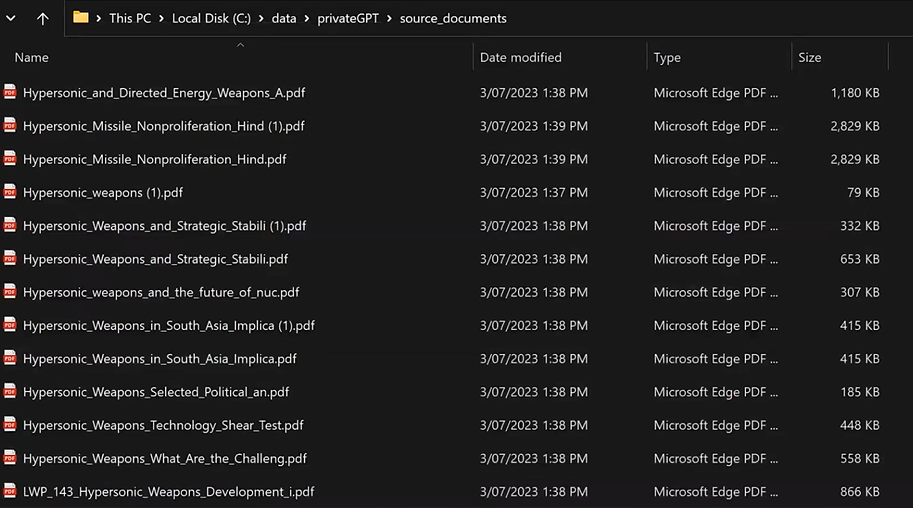PrivateGPT: Use Cases in OSINT
- Jacob Hunter
- Aug 8, 2023
- 4 min read
Updated: Aug 9, 2023
While open source information is, by definition, publicly available, aggregated open source data can still reveal sensitive details about our methods, interests, and intelligence objectives. As such, data privacy and security is important. This can limit our ability to use tools such as ChatGPT or Google Bard as these models predominantly draw from the public web, leaving them lacking when it comes to proprietary information and intelligence insights (they use our inputs to improve their outputs, just ask Samsung). So, is PrivateGPT the answer?
It could be, especially if you have your own database of information that you wish to query.
What is PrivateGPT?
PrivateGPT is a concept where the GPT (Generative Pre-trained Transformer) architecture, akin to OpenAI's flagship models, is specifically designed to run offline and in private environments. Unlike its cloud-based counterparts, PrivateGPT doesn’t compromise data by sharing or leaking it online. This private instance offers a balance of AI's generative power without the risk of data breaches. Its key advantage? Offering conversational insights instead of requiring analysts to sift through numerous documents following a keyword search.
At present, PrivateGPT serves as a prototype - it points to a future where workplaces, including those that work with sensitive data, will have the ability to create a fully local ChatGPT-like assistant. It is easy to see the potential. Need to pinpoint an individual in a vast dataset? Identify patterns of significant activities in a conflict zone based on past records? Or ascertain if a particular technology has been observed in an area before? If so, query your local GPT, with output based on credible reporting that your team has placed into the database, to quickly understand the what, where, when, why, who and how of an issue.
The PrivateGPT repository is available on GitHub and designed to leverage the capabilities of a GPT-based prompting system using personalised datasets, ranging from CSVs and .doc files to email archives, PDFs and PowerPoints. The GitHub page provides comprehensive setup and usage guidelines. While the command-line interface might initially appear intimidating, the instructions help to simplify the process. Once configured, we can feed our documents into the system.
Tools like PrivateGPT can revolutionise workflows
Operating exclusively within a user's environment ensures that OSINT data and previous intelligence reports aren't exposed to external servers, minimising breach risks. Analysts have the opportunity to refine their private models with specific datasets, boosting the model's precision and relevance for OSINT tasks.
Analysts can use PrivateGPT for effective data synthesis and interrogation, freeing up time for deeper intelligence tasks. Nonetheless, insights from all AI tools should be viewed critically; human validation remains vital to confirm the accuracy and pertinence of AI-generated content.

Limitations
PrivateGPT, while useful, presents certain challenges.
Depending on the size of your dataset, offline operation may require powerful hardware, but advances in servers and GPUs are closing this gap, lowering the barrier to entry.
Manual updates are necessary to keep PrivateGPT models up-to-date, unlike online models.
PrivateGPT can produce great results, but its output shouldn’t be taken as gospel. Analysts should treat its insights with caution, applying critical thinking and validation processes to ensure reliability and relevance.
Training from scratch could be costly and resource-intensive in the short-term, exemplified by Bloomberg, which trained a language model on 40 years of their data.
Building and Adding Value
Instead of laboriously examining a document for information using the standard 'Control + F' search function, you have the option to train the GPT on a specific document. You might subsequently use it to gather an overview of the content by using a query in a conversational manner.

By downloading several research papers on a specific subject, like human trafficking or hypersonic weapons, and ingesting them all into your database, you create a system that can provide comprehensive, human-like responses, from multiple sources.

This data could also be represented in a .CSV format and then queried to provide insights, trends, or even statistical information, albeit with potential limitations in terms of detailed statistical analysis. Use cases might include:
Support retail security, by sifting through shopping centre environmental data, crime statistics, and academic papers to help make assessments to minimise in-store theft.
Assisting conservation efforts by processing and analysing scientific journal articles globally, identifying previous focus areas and gaps in knowledge.
Supporting corporate security, by analysing datasets, including corporate records, security incidences, financial and legal data, helping to pinpoint vulnerabilities.
It's worth mentioning that data ingestion isn't always a smooth process. You may encounter errors due to data formatting or character encoding issues. But don't let this deter you. These issues are not insurmountable. The system flags problematic files, and users may need to clean up or reformat the data before re-ingesting. Despite this, using PrivateGPT for research and data analysis offers remarkable convenience, provided that you have sufficient processing power and a willingness to do occasional data cleanup.
To learn more about PrivateGPT, and to expand on the above, view the recorded webinar with our CEO and Founder, Chris Poulter by going to https://academy.osintcombine.com/p/osint-knowledge.
Key Takeaways
PrivateGPT is a version of the GPT architecture designed to function offline in private settings. Unlike cloud-based models, it doesn't compromise data integrity by sharing or leaking it online, making it a useful tool for those prioritising data privacy.
Tools like PrivateGPT can transform workflows for the OSINT tasks by aiding analysts in data synthesis, and data refinement with specific datasets for enhanced accuracy.
While PrivateGPT is powerful and can be trained on diverse data ranging from academic papers to datasets in various formats, it does come with challenges. These include the need for reasonable hardware, manual updates, and careful interpretation of its outputs.
To support your OSINT collection and analytical capability uplift, please don’t hesitate to contact us at training@osintcombine.com to learn about our online academy and bespoke training offerings.



